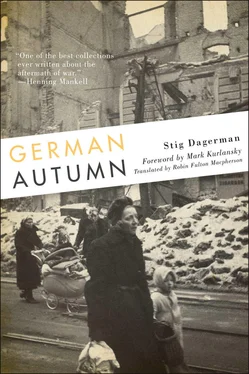Herr Krause has listened to foreign radio stations and had a Jewish cousin. Herr Krause, who joined the Party in 1940, is a small, coughing accountant with nervous glasses that ceaselessly wander between his nose and the table. Herr Krause has sixteen long testimonials from the bank management, from bank colleagues, from neighbours, from a doctor who treated him, from a lawyer who had handled his divorce. Herr Krause reads them all out in a soporific nasal voice while the court slowly drifts to sleep and all that can be heard is the rustling of sandwich-paper at the back of the big room.
Why did Herr Krause become a Nazi in 1940?
The testimonials say that it was a matter of divorce proceedings which had begun in 1930 and, unchecked by the onset of Nazism, had dragged on, so that by 1939 Herr Krause was poor and ulcerous. By 1940, driven to the point of despair and passed over to the advantage of colleagues who were Party men, Herr Krause decided to take the repugnant step.
The judge intervened here:
‘It didn’t perhaps have something to do with the fact that in 1940 France was defeated, Herr Krause, and you found it convenient to show your sympathy for the victor, since this would in all likelihood guarantee you a position with a considerably higher salary?’
No, of course not. Herr Krause is no Nutzniesser (profiteer), Herr Krause would not take advantage of any apparent victory. Yes — apparent. One did listen to foreign broadcasts. Moreover while Herr Krause was certainly promoted he had to perform his duties in a bank on the eastern front, ‘and, My Lord, for a man with my weak stomach …’ No, Herr Krause was simply ill and poor, and something had to be done to avoid a catastrophe. One simply has to look at the testimonials.
In the meantime the defence lawyer is leafing through a thick decree. With a triumphant smile he at last begs permission to speak. It has perhaps not been made clear in the testimonials, but Herr Krause is in fact still employed by the same bank, which is now working for the occupying powers, and according to the denazification law Germans employed by the military government cannot be accused of Nazism.
‘For is it likely, My Lord, that the Americans would appoint a suspected person, and in, may I add, such an important post?’
The court falls silent and in the deathly stillness a thick and invisible blanket of censorship settles softly over the proceedings. The case against Herr Krause is promptly dropped. Herr Krause — small, nervous, humble, ever-dutiful, with his divorce and his bad stomach, wedging his glasses on his nose, gathering together his sixteen typewritten testimonials and stuffing them into his shining briefcase, a kindly, hunched little man who bows to the judge, the assessors, the defence lawyer and the prosecutor — then hurries off out of the court-room, just as fearful of arriving late for his bank duties in 1947 as he was in 1924, in 1933, in 1940 and near Stalingrad in 1942.
Then comes Herr Sinne and he is not a kindly man. Herr Sinne is seventy-three years old: fragile, white-haired and with his doll-like head looking like a pensioner-angel. But Herr Sinne is no angel. Herr Sinne is summoned as an activist. He was a section leader in Frankfurt, and no testimonials to the effect that he was nice to Jews or listened to English broadcasts can help him. The court has testimony that Herr Sinne has said: ‘My section will be free of Jews.’ The court has witnesses who can tell that Herr Sinne threatened to report shopkeepers in his section if they dared to sell groceries to Jewish customers. It was only after closing time that the Jewish witnesses could sneak into the shops from the back and buy what they needed. A woman witness has often seen Herr Sinne listening at the letter-box of a Jewish girl-friend of hers. The son of a Herr Meyer, whose balcony could be observed from Herr Sinne’s window, had one evening stood on the balcony with a Jewish girl. Next day Herr Meyer had a reminder from Herr Sinne that he should not have Jews on his balcony.
Meanwhile Herr Sinne is sitting there letting his squirrel-eyes dart between the witnesses, and perhaps it is just an optical illusion but there is a sudden impression that Herr Sinne is surrounded by a membrane of cold dread, this dried-up old-man’s body radiates a deathly chill that sends shivers through a spectator ten metres away.
One of the Jewish witnesses relates:
‘A high Party official lived in Herr Sinne’s section but we were never afraid of him. We were always afraid of Herr Sinne. Herr Sinne was not one of the Nazi highlights, but Herr Sinne was one of those quiet, dependable, terribly effective cogs without which the Nazi machine would not have kept going for one day.’
Herr Sinne gets up slowly.
‘Herr Cohn, you always greeted me in such a friendly way every day,’ he says shrilly. ‘You never looked as if you had anything to complain of.’
‘Herr Sinne,’ says the judge mildly, ‘I am convinced that many people greeted you courteously because they were frightened of you.’
‘Frightened of me? A sick old man!’
‘Just look at this ageing face,’ cries out the defence lawyer pathetically. ‘Does it look as if it could frighten anyone?’
One of the women witnesses becomes hysterical.
‘Think instead,’ she screams, ‘of the faces of the old Jewish men in Herr Sinne’s section!’
Herr Sinne explains that everything is lies, the balcony in question is not visible from his window, he has never said that his section was to be free of Jews, and he has never forbidden anyone to shop in his section. The case is postponed for a week, and then the shopkeepers will be called in as witnesses, and Herr Sinne, all alone and with his gaze fixed on some point in the past goes his way with a childish seventy-three-year-old forehead raised proudly against the contempt murmuring behind him.
The Walter case is simple but interesting. Walter himself is a giant with a club-foot who the moment he enters throws his stick on the table and accuses the Hessen government of corruption, but he is bluntly silenced by the judge. Walter was an official in a Nazi commission and is accused of being an informer, but what is interesting is that Herr Walter is still in the same commission in 1946 and it is in 1946 that he has had enough money to buy a farm in Hessen. He has been reported by Herr Bauer, a fat and slow-witted horse-dealer who does not look as if he has gone hungry for one moment in the land of hunger. It soon turns out that the horse-dealer’s motives are not as noble as they might have appeared. The two gentlemen have quite simply quarrelled with each other over an illegal consignment of oats, delivered to a nameless American major, of whose existence next day’s newspaper report very properly remains silent. The horse-dealer then suddenly remembered his competitor’s Nazism and reported him. The case is adjourned for lack of evidence, but the judge cannot forgo a sarcastic remark to the horse-dealer:
‘The old masters were easier to deal with, weren’t they?’
But the horse-dealer confidently replies: ‘The new ones are all right too, My Lord.’
And what he says is true, and what is so hopeless and idiotic and tragic is that the new masters in commissions and in decision-making organs are in fact ‘all right’ for anyone who is sufficiently free of prejudice, for anyone who knows the art of wearing whatever colours he chooses. It is harder for the victims of Nazism because they meet obstacles everywhere. They have the right to seats in trains and priority in queues, but would never dare dream of making use of such a right, but for Messrs Walter and Bauer a providential power, often of American nationality, has placed redeeming trap-doors in the lamentable stage-boards of the denazification courts.
Читать дальше












